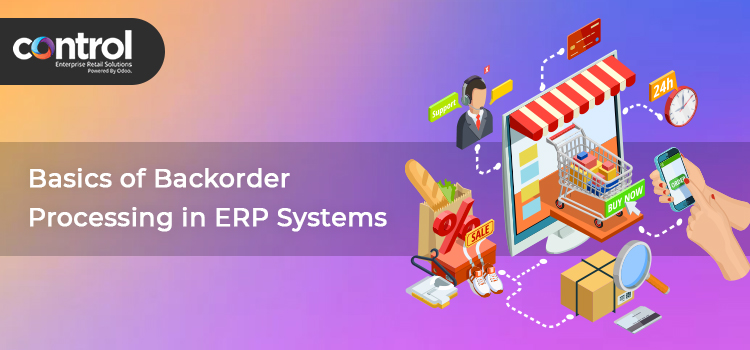Basics of Backorder Processing in ERP Systems
- June 3, 2019
- By controlerp
Retailers have integrated their eCommerce stores with ERP systems like Odoo to ensure that their business runs seamlessly. These software suites come packed with every module that a business owner can ask for – sales, purchase, inventory, production & planning, accounting, and much more.
Backorders are a part of the sales module and are quite common in the online retail industry. But what is it exactly?
Well, backorder means giving your customers an option to purchase your products even when you don’t have them in stock partially.
The blog will shed light on the benefits and challenges associated with backorders. You will also get some expert tips on how to handle backorders efficiently before they become overwhelming for your business.
Benefits of Backorder Processing
For a struggling business, being out of stock is usually a nightmare. It has adverse long-term impacts on businesses such as loss of market share due to customer dissatisfaction, loss of patronage, and negative word-of-mouth publicity.
Backorders can save the day for your business. Apart from retaining customers, you can save a lot of your time and resources if you plan to run your business on backorders. This business model can fit in perfectly for a company that provides expensive, handmade, or perishable products. Simply inform your customers that the delivery time will vary for the items. You can also keep a small quantity of the most popular products in stock so that site visitors are not turned away instantly. This way you’ll save heavily on storage and service costs.
Challenges in Backorder Processing
Inventory management is one of the main concerns that is associated with backorder processing. As a retail business, you will end up managing lakhs of orders and thousands of backorders on any given day. Given below are some of the practical challenges that you might face while back ordering products:
- Consolidation of all out of stock products from multiple sales orders into a purchase order.
- Ensuring that all the sales orders with back ordered products are recorded accurately.
- Placing a purchase order for the ‘out of stock’ items with the supplier.
- Upon re-stocking, matching the sales order of received products to the correct purchase order.
Fulfilling backorders effectively gets tough as your business expands. A cloud-based ERP system is your best bet to deal with the massive volume of orders.
Tips to Avoid Failures in Backorder Processing
I am listing down some of the best practices that can be followed by businesses to succeed in the game of backorder processing.
- Be honest. Tell your customers upfront that you are out of stock and that the product will be back ordered.
- Give good customer support so that your customers can use it to determine the current status of their order(s).
- Plan your inventory properly and focus more on the popular and hard to get products.
- Analyze your sales distributor landscape to shorten the delivery time of products.
- Optimize your supply chain management system so that you are well-equipped to meet an unexpected surge in demand, especially during festive seasons.
- Always offer to cancel with no questions asked. It proves that you are trustworthy and not some random website that is after the hard-earned money of the public.
Are you looking for a Qualified ERP professional to help your business?
A Final Word – Create Backorders But Not Backlogs
Backorders are indeed an excellent way to run a cost-effective eCommerce business. But care should be taken so that you don’t backlog orders in the process. A backlog is a set of orders that have not been shipped yet.
Let’s consider an example – a customer wants you to ship their holiday order on New Year’s Eve i.e. December 31 and they send you the order on December 10. From December 10 to December 31, that order is part of your backlog. If for some reason, you cannot ship that order on December 31, then a backorder is created. You should avoid getting into such situations and schedule the products to be shipped at a later date. If unavailable, set rules for the system to create a backorder immediately.
About Control ERP –
Control ERP is a cloud-based ERP system that is powered by Odoo. It is a perfect product for retailers and can orchestrate an omnichannel experience for them. You can get in touch with us to discuss a business idea or schedule a live demo at your convenience.

